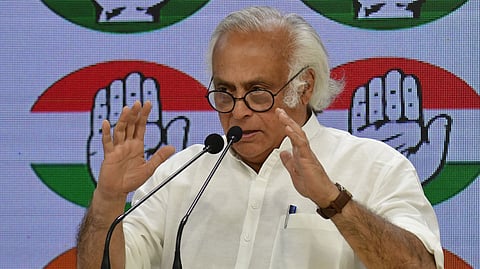

NEW DELHI: The Congress on Friday announced that it would move the Supreme Court against the contentious Waqf (Amendment) Bill, 2024, which was passed in both the Lok Sabha and Rajya Sabha after 12-hour debates in the Houses.
This comes a day after Tamil Nadu Chief Minister M.K. Stalin’s announcement in the State Assembly that the Dravida Munnetra Kazhagam (DMK) will also approach the Supreme Court to challenge the bill.
In a statement, AICC General Secretary Jairam Ramesh said that the Indian National Congress (INC) will soon challenge the constitutionality of the Waqf (Amendment) Bill, 2024, in the Supreme Court.
“We are confident and will continue to resist all assaults by the Modi government on the principles, provisions, and practices enshrined in the Constitution of India,” he said.
Recalling the petitions filed by the party challenging key bills passed by the Modi government, Ramesh mentioned that the party’s challenge of the Citizenship Amendment Act (CAA) of 2019 and the 2019 amendments to the RTI Act, 2005, are currently being heard by the Supreme Court.
“The INC’s challenge to the validity of the amendments to the Conduct of Election Rules (2024) is being heard in the Supreme Court. Additionally, the INC's intervention to uphold the letter and spirit of the Places of Worship Act, 1991, is also under consideration by the Supreme Court,” he said.
Both the Lok Sabha and Rajya Sabha passed the Waqf (Amendment) Bill after marathon 12-hour-long debates.
The Lok Sabha cleared the Bill after a division of votes, with 288 votes in favor and 232 against. In the Rajya Sabha, 128 members voted for the bill, and 95 voted against it. The Bill will now be sent to the President of India for assent before becoming law. Both Houses witnessed fierce debates, both in defense of and against the Bill.
While discussing the Bill, Home Minister Amit Shah assured the Muslim community that the new Bill does not interfere with their religious practices. However, the opposition strongly opposed the bill, calling it ‘unconstitutional’ and accusing the government of attempting to seize Waqf properties from the Muslim community.
Key provisions of the bill include:
Only practicing Muslims (for at least five years) will be allowed to dedicate their property to Waqf, restoring the pre-2013 rules.
Women must receive their inheritance before making a Waqf declaration, with special provisions for widows, divorced women, and orphans.
Trusts created by Muslims under any law will no longer be considered Waqf, ensuring full control over the trusts.
The bill proposes that an officer above the rank of collector will investigate government properties claimed as Waqf.
In case of disputes, the senior government official will have the final say on whether a property belongs to Waqf or the government. This replaces the existing system where such decisions are made by Waqf tribunals.
The bill also proposes the inclusion of non-Muslim members in both the central and state Waqf boards for greater inclusivity.
The bill was first introduced in August 2024, after which, as requested by the House, it was referred to the Joint Parliamentary Committee (JPC), which held extensive consultations on it. The JPC report was approved by the Union Cabinet before the bill was tabled in Parliament.